Pivot Bio: transforming the food system & reducing emissions

As the human population rises and the focus of climate change shifts onto the methods of food production, many farmers are looking for sustainable solutions.
Pivot Bio offers a clean alternative to synthetic nitrogen fertiliser. Vice President Ernie Sanders tells Sustainability more...
Pivot Bio creates fertiliser through altering microbes which do not release nitrous oxide - a greenhouse gas. How did you develop this technology?
“Synthetic nitrogen fertiliser feeds 50% of the world’s population. We need it, but it does not help our planet. The fertiliser decomposes into nitrous oxide which is responsible for about 5% of global warming. This prevents the natural ability of soil microbes to produce nitrogen that nourish food crops. Farmers are looking for sustainable alternatives and Pivot Bio is going to help food production. We are the only product with a solution to this problem. We are better for farmers, better for the environment, better for my grandkids. I have never worked harder and never had more fun.”
Tell us a fascinating fact about microbiomes.
“They are a living, breathing balance in nature - a huge community: there are three trillion in a spoonful of soil. They have different needs. We can supplement the microbiomes, when you start to artificially manipulate the soil. It’s hard to define what a healthy soil is, but when we lose the healthy soil, we need to help it out.”
9% of the world lives without sufficient access to food - and the human population is expected to increase to 9bn in 2050. How can Pivot Bio help address this?
“Synthetic nitrogen is very expensive and hard to get to the smallholders. The way Pivot Bio is going to help is we are going to be able to give fertiliser to those places which are developing. We are adding new crops to our portfolio, adding sunflowers, which is giving us a sustainable footprint.”
Are there any plans to cross Pivot Bio with vertical farming, or any other sustainable foodtech?
“We have been contacted by vertical farming companies, we have been contacted by other producers. We are always interested in seeing how they are impacted. We are a very new company and we want to get to where we need to be, but it’s definitely in our minds."






